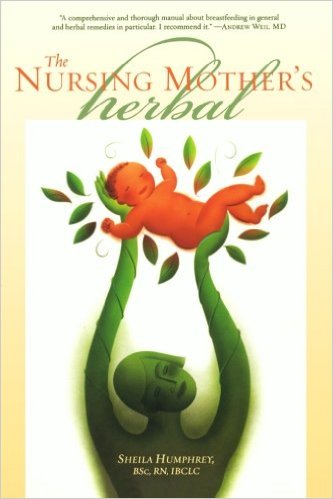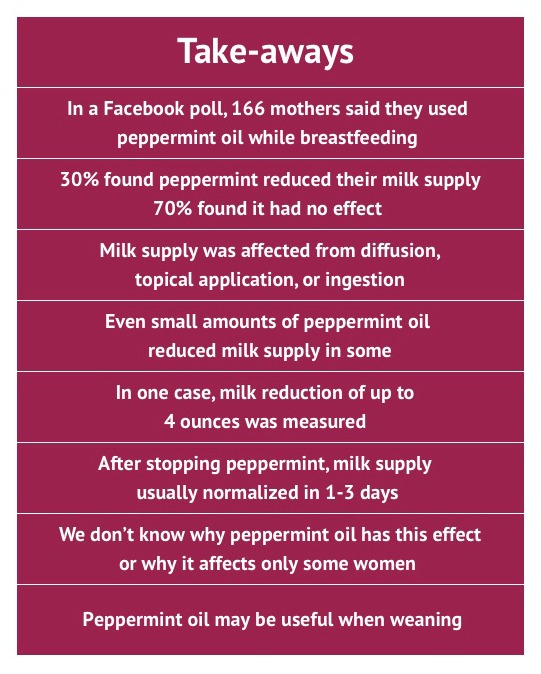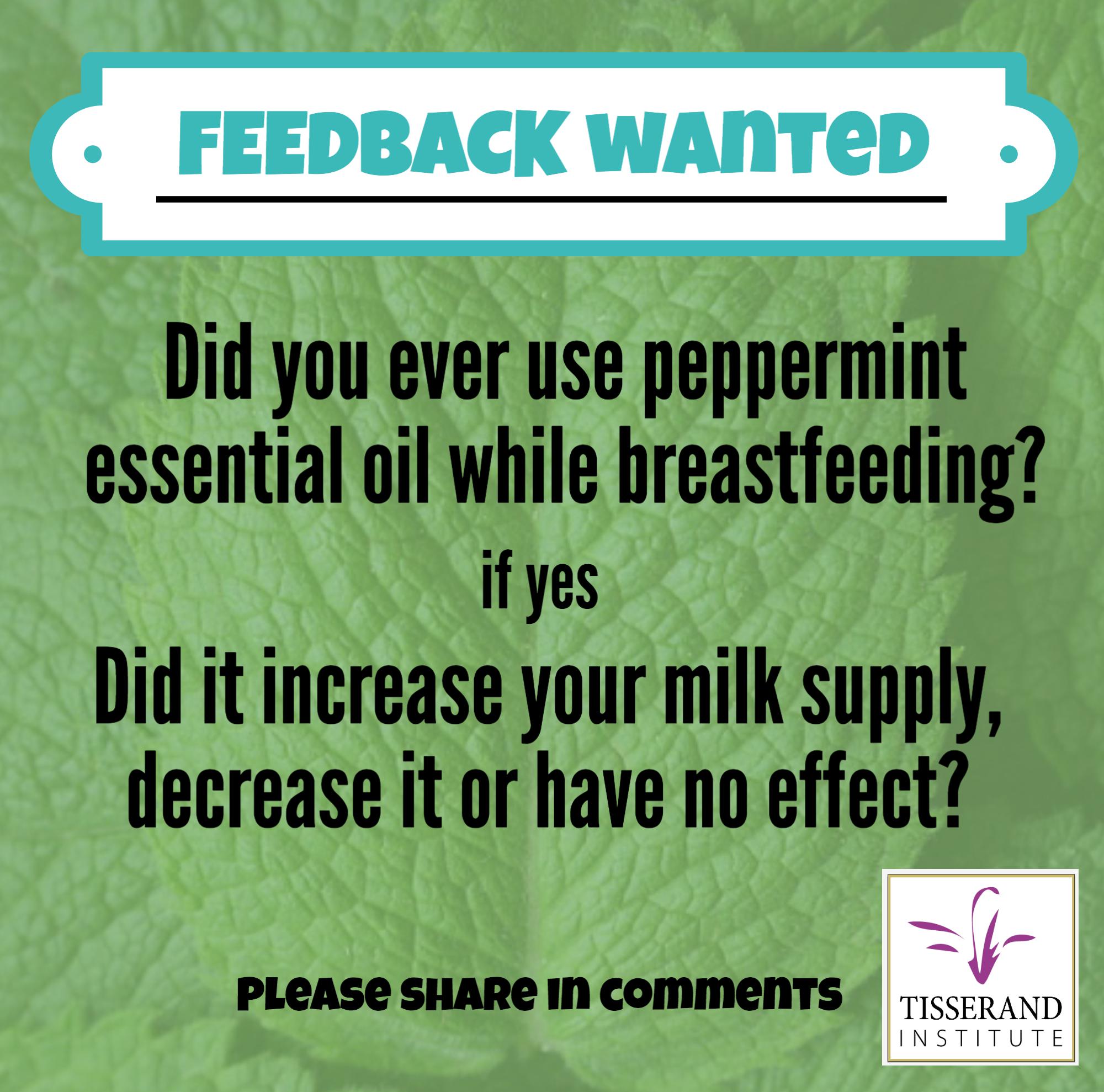by Robert Tisserand
Can peppermint oil reduce milk supply if you’re breastfeeding? In the past my answer to this question was always that I didn’t know, and that there was no research on this. Nor could I imagine why peppermint oil would have such an effect, though I’m always open to learning something new.
There are studies in which peppermint oil was used by breastfeeding women, but none of them looked at the milk supply issue. In two clinical trials at the Tabriz University of Medical Sciences, a gel containing 0.2% peppermint oil was applied to heal cracked nipples in a total of 114 women with promising results (Melli et al 2007, Shanazi et al 2015). However, milk supply is not mentioned in either report. In other research, 18 nursing mothers ingested capsules containing 100 mg of menthol (equivalent to 6-8 drops of peppermint oil) on three consecutive days, and small amounts of menthol were measured in their milk over the next eight hours (Hausner et al 2008). But even in this study, milk production was not reported.
 I had heard that peppermint oil reduced milk supply in some mothers, but I could find no reliable information, nor could Camille Freeman, associate professor at the Maryland University of Integrative Health After searching a number of herbal texts she found just one anecdotal report of lactation being inhibited from eating Altoid mints, in The Nursing Mother’s Herbal.
I had heard that peppermint oil reduced milk supply in some mothers, but I could find no reliable information, nor could Camille Freeman, associate professor at the Maryland University of Integrative Health After searching a number of herbal texts she found just one anecdotal report of lactation being inhibited from eating Altoid mints, in The Nursing Mother’s Herbal.
So I decided to ask my Facebook audience, where we posted the message below on December 2nd 2016. Over two days there were over 222 comments, from which I extrapolated 166 relevant responses. Let me hasten to add that this is not scientific research, and it’s not even a controlled survey where each person answers a carefully crafted set of questions. But it did answer my most pressing question – is this a real issue for some women?
Yes it is. What we found from our poll was that 30% (50 of 166) reported peppermint oil reducing their milk supply, and 70% (116 of 166) said that it had no effect. In polls or surveys of this nature, people who noticed an effect are often more likely to respond than those who didn’t, so the numbers we found may not be representative. But even if it’s only 20% and not 30%, it’s still a significant minority. And let’s not forget, with any type of medicinal or herbal preparation, not everyone is affected in the same way.
With hindsight, perhaps I should have asked about peppermint use in breastfeeding groups. One comment confirmed that what I found is nothing new: I’m a former LLL leader and have talked to many nursing moms over years. In my experience I’ve found peppermint is like many other things recommended for nursing moms to stay away from, every woman is different. Some are affected and some are not. It doesn’t seem to have as strong an effect as something like decongestant, however. I generally advised caution if there was already an issue with low supply or baby not nursing well, just to be on the safe side.
However, if you search online, you will find various lists of herbs that are reputed to decrease milk supply, but again there is no solid reference for this. For example: Just as there are herbs that may help increase milk production, others seem to decrease it. Parsley is a seasoning herb considered to have lactation-suppressing properties in large amounts, such as in a dish like tabouleh. Peppermint and sage are reputed to decrease milk production when consumed in large or concentrated amounts. Frequent brushing with toothpaste containing real peppermint oil or even eating potent peppermint candies has caused trouble for some mothers. Fortunately, most of these herbs don’t causeproblems unless they are consumed regularly or in large amounts. More here. So I wanted to find out for myself to what extent this was real.
How peppermint oil was used
We received many detailed responses, and everyone who I asked for more information was happy to give it. I asked follow-up questions to most, but for some I didn’t because by that point I had enough of a clear picture. Not everyone had used just peppermint oil. Six used it with other oils, and 5 used mint in multiple forms (peppermint oil, tea, toothpaste etc.). Two of the 50 I included just used peppermint tea. A total of 6 people used diluted peppermint oil applied topically, and nothing else. Another 6 ingested peppermint oil, some in candy, but no other oils, and four diffused just peppermint oil. So that’s a total of 16 that used just peppermint oil, and in various ways. The mode of use varied widely, adding strength to the argument that this is a real effect. The following are just examples:
Inhalation / diffusion
Inhalation for migraine was enough to drastically reduce mine. Inhaled 2-3 times a day for maybe two days. Tanked my supply drastically at around 4 months post partum.
I was diffusing peppermint as well as using some to clear my airways when stuffy. I noticed my milk started to decrease so I stopped using it and my milk came back in a day or so.
Topical
I used it to break a fever of 104 for 5 days that nothing else was touching. It broke the fever immediately and it never came back but my milk supply took a serious hit and took three days to recover. It was worth it though. I used 2-3 drops in 3tbsp coconut oil on my feet and calves. I know peppermint isn’t kid safe so I wanted to use it as safely as I thought I possibly could.
I did for an extremely bad migraine and noticed a drop in milk supply for a day. I used it topically diluted with coconut oil – a drop on each temple and one on the back of my neck.
Oral
I used it while my babe was barely 3 months old. With just a few drops a day, my milk almost completely dried up in 2 days. Now she is over 2 years, I use peppermint and it seems to have no effect on my supply. My theory is if you are not yet firmly established, you will be more susceptible to its effects. I dropped a couple drops in water a few times a day for appetite control.
My milk supply almost dried up after eating a lot of junior mints candies that contain peppermint eo. Luckily I realized in time and was able to get my milk back
 How much peppermint oil could reduce milk supply?
How much peppermint oil could reduce milk supply?
You would probably expect to see a dose-dependent effect, though only two mothers actually reported this:
No effects, in little amounts. But if I use more than 10 drops in one day, it affects.
I was extremely sensitive to peppermint. A single drop and my supply would take a huge hit. I could inhale it only.
In quite a few cases, even small amounts of peppermint oil had an effect, for example:
Decreased. I couldn’t even diffuse it. Had to look closely at blends, soap, facial, hair & spa products before using. Mint decreased my supply.
I diffused it without thinking at work and noticed a significant decrease in what I was able to pump.
I breastfeed for more than 5yrs (3 kids) and it does affect me, even if I just inhale it so no peppermint for us.
I had a peppermint beadlet (1/4 of a drop) and my milk supply went down very much for about 24 hours
I had it in toothpaste and it cut my milk supply in half. I was already low supply, so it was devastating.
I swore I saw decrease in my production with even a couple of peppermint candies.
I didn’t use peppermint essential oil, but I did have a decrease in supply after eating mint chocolate ice cream or mint candy. It took a few days and a lot of effort to get my supply back to normal.
I didn’t use peppermint oil, but foods with it had a big impact!
Extent of reduction measured
Mothers who pumped had the opportunity to measure how much their milk supply was reduced:
Yes, it decreased my milk supply up to 3oz. Production back to normal after one week without peppermint eo. I used it topically as one of ingredient in my diy deodorant (eo + vco). Diluted ratio 1:7.
When I was breastfeeding, my son was unable to nurse, so I exclusively pumped, and had a very good idea of how many ounces per day I would produce. I wasn’t big into EO use at that time, but one of my favorites to smell and use for tension in my neck happened to be peppermint. On the occasions that I used it topically (2-3x per day on the back of my neck), or directly inhaled it, I would see a decrease by the next day, anywhere from 1-4 ounces total. It would continue for as long as I would have contact with the oil, then come back up a few days after stopping. The same was true for treats and teas that contained actual peppermint leaf (or extract). Dilution was probably very high, as I didn’t have any knowledge of dilution at the time, I would say it was nearly a half and half dilution…a small amount of carrier in my palm, and a drop of peppermint.
Milk supply re-established after stopping peppermint
Not that we really need more corroboration, but this is strong evidence of a cause-effect relationship and not just a correlation.
My milk decreased after repeatedly using peppermint over a long period of time. Milk supply increased when I stopped using peppermint.
Supplements with peppermint oil dropped my milk supply significantly. Restored as soon as I quit.
I noticed a decrease when diffusing. I diffused a blend, not even thinking about the peppermint. Noticed a decrease over the next couple of days. Put it together, stopped diffusing, supply went back up.
What about those who found no effect?
As with the mothers who found that their milk supply was reduced, those who found no effect used peppermint oil in all possible ways.
I did use it, topically and internally while breastfeeding and nothing happened!
I’ve diffused it, used it topically for headaches and eaten it in black bean brownies a few times and never had an issue!
I use it all the time with absolutely no effect. I use topically & ingest it. I am currently BF a 3.5 yr old & 1 yr old and have soooooo much milk!
I’ve used it topically and in a personal inhaler and have never noticed any difference.
I’ve used it both singly & in blends, properly diluted, while breastfeeding & it has never affected my supply.
I used internally, and aromatically and it didn’t do anything to my supply
No effect that I have noticed. I have used for topically for headaches/around the neck area, steam inhalation, foot bath and diffusing.
It had no negative effect on me whatsoever. I used it almost exclusively for headache medicine when I was nursing (1-2 drops neat, split between my temples, forehead, and back of neck. I also used enteric-coated peppermint capsules for IBS.) My supply never dipped.
I used a peppermint inhaler occasionally for headaches with no effect on supply. I also treated the pain and swelling of mastitis with a topical blend containing peppermint diluted at 3%, and did not notice a decrease in supply. But it did help with the pain.
Tried when weaning
I used it when weaning. It definitely reduced swelling, but I can’t say that it decreased milk supply since I was going to do that no matter what.
Zero effect~ I used it to TRY and dry myself up… nada.
No effect on my supply.. I tried it while weaning.
I used it religiously to dry up my supply while weaning – nothing. No effect at all – ouch!
Making sense of this phenomenon
I believe this is the first attempt to find out whether peppermint oil does reduce milk supply by collecting reports, along with how, and how much peppermint oil was used. Clearly, some mothers are affected and others are not. Even a small amount of peppermint oil will reduce milk supply for some women Among those who reported no effect, some were trying to reduce their supply because they were weaning. However, why peppermint oil affects some and not others is not known, and our poll shed no light on this.
 Two comments mentioned spearmint tea as being effective, for example: Even spearmint tea causes a decrease for me. However, it’s worth noting that the most obvious active constituent in peppermint oil is menthol, and yet while peppermint oil contains 30-50% menthol, spearmint oil only contains 0.5-1%, about 50 times less. Sage tea is also rumored to decrease milk supply: Sage is typically the herb they say to avoid, as well. I exclusively pumped, and was part of a Facebook group with 14k members that all exclusively pumped as well, and we all avoided peppermint anything, menthol, decongestants and sage like the plague. But sage, spearmint and peppermint have little in common apart from belonging to the massive Lamiaceae family, so this merely deepens the mystery of why this happens.
Two comments mentioned spearmint tea as being effective, for example: Even spearmint tea causes a decrease for me. However, it’s worth noting that the most obvious active constituent in peppermint oil is menthol, and yet while peppermint oil contains 30-50% menthol, spearmint oil only contains 0.5-1%, about 50 times less. Sage tea is also rumored to decrease milk supply: Sage is typically the herb they say to avoid, as well. I exclusively pumped, and was part of a Facebook group with 14k members that all exclusively pumped as well, and we all avoided peppermint anything, menthol, decongestants and sage like the plague. But sage, spearmint and peppermint have little in common apart from belonging to the massive Lamiaceae family, so this merely deepens the mystery of why this happens.
Currently there’s no way to predict whether peppermint oil will affect your milk supply, so caution is needed, even with peppermint tea and peppermint-flavored confections. The consensus of opinion is that there is more likely to be an effect before lactation is firmly established, and certainly peppermint should be avoided if there are problems in producing milk. But it may be useful when weaning, or if there is engorgement for other reasons. Finally, should you try a 0.2% peppermint oil dilution for cracked nipples? (That’s 2 drops of essential oil in 1 oz of base). Maybe try initially on one nipple to see how it affects you.
References
Hausner, H., Bredie, W. L., Mølgaard, C., et al (2008). Differential transfer of dietary flavour compounds into human breast milk. Physiology & Behavior, 95(1–2), 118–124
Melli, M. S., Rashidi, M. R., Nokhoodchi, A. et al (2007). A randomized trial of peppermint gel, lanolin ointment, and placebo gel to prevent nipple crack in primiparous breastfeeding women. Medical Science Monitor, 13(9), Cr406-411
Shanazi, M., Farshbaf Khalili, A., Kamalifard, M. et al (2015). Comparison of the effects of lanolin, peppermint, and dexpanthenol creams on treatment of traumatic nipples in breastfeeding mothers. Journal of Caring Sciences, 4(4), 297–307




My ex put Japanese peppermint oil on my low back about ten days after I gave birth. I had back labour and was still in muscle pain. I went from producing enough for twins (I was not only feeding my newborn but also helping a local mom with twins by giving her half of my supply) to within 24 hours not producing any milk and at the doctors office seeking help. I struggled with producing enough for just my baby till I was forced to give up around 7 months. It was taking a serious strain and toll on my mental health.
Japanese Peppermint oil is used by dairy farmers to treat mastitis in dairy cows. They can be used together with antibiotics. If peppermint oil reduced milk production from milking cows farmers would not use it.
Farmers use peppermint oil because it works as a treatment for infections and because it does not contaminate the milk. If antibiotics are infused into the cows udder or given by injection the antibiotics are passed into the milk itself. Milk has to be withheld and thrown away for three days or more to prevent milk from farms, going to the dairies, being contaminated. If there are antibiotics in milk being used for cheese making any antibiotics will kill or suppress the bacteria needed to convert milk into cheese. Milk from cows treated with Japanese peppermint oil does not have to be withheld.
Just seen your Comments. Dairy Farmers Have used Japanese Peppermint Oil for many decades mainly to treat Milking cows for mastitis. j.p.o.is not the same as ‘Peppermint oil’. it’s different. it works like an antibiotic but does not contaminate milk I do not think farmers complain J.P.O. reduce s milk production in cows.
It can also be used on people to cure toothache. Just apply a single drop of Ointment to the outside of the cheek next to painful tooth. Should reduce pain within hours and provide medium or long term resolution. Cost per treatment minimal.